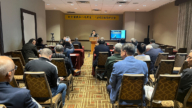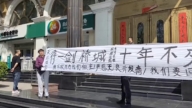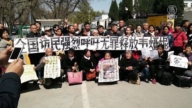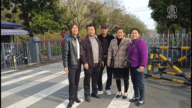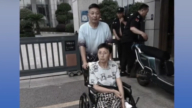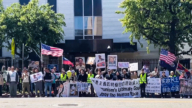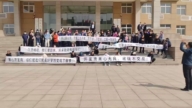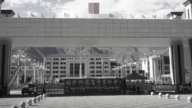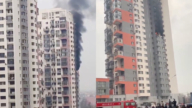【新唐人2012年1月16日訊】1月14號,深圳三洋電機三千多名員工,因為勞資糾紛集體罷工。當局出動防暴警察鎮壓抓人。13號,江西昌河汽車廠兩千多名職工也因不滿長期的低工資,發起大罷工。學者認爲,新年伊始,大陸維權運動此起彼伏,預示著2012年社會動盪加劇,而中國的轉型必須依靠民衆的抗爭才可能實現。
14號上午11點左右,數千工人將深圳三洋電機公司的沙井鎮工廠包圍,工廠車間內空無一人。據工人描述,三千多員工參加了罷工,現場秩序比較平靜,但廠方一直沒有人出來回應。
下午1點多鐘,防暴警察和沙井鎮民兵突然趕到現場,將幾名工人強行抓上防暴車。工人頓時情緒激憤,高呼「放人」,現場氣氛十分緊張。
到下午2點半,終於有廠方負責人在防暴警察陪伴下,與工人們對話。隨後,一部分人開始離開。
有工人介紹說,公司已經被收購,卻不給工人任何補償,工人們無法接受。
13號,江西「昌河汽車」景德鎮工廠也出現了大罷工。二千多名員工抗議母公司「長安集團」在沒有召開職工代表大會的情況下,隱瞞職工賣掉「昌河汽車」的品牌資質。而且,長安和昌河已重組兩年,職工的工資卻一直停留在每月1700元。
有職工代表表示,希望保留「昌河汽車」資質,同時提高工資。在過年前,如果廠方沒有解釋就集體進京上訪。
元旦期間,河南、寧夏等地就已經發生了多起維權抗暴事件。
廣州律師唐荊凌:「2012剛一開年,就是延延不斷的有一定規模的社會抗爭,這些應該講是一個比較好的現象。中國民衆越來越敢於表達自己的訴求,越來越敢於反抗壓迫,反抗不公平。」
香港《東方日報》的一篇評論指出:中國大陸以此起彼伏的維權運動揭開新年序幕,意味著中國今年的社會衝突將加劇。
「深圳當代社會觀察研究所」所長劉開明:「實際上從04年以後工人的罷工在持續上升,到10年我們看到大規模的行動。2011年不僅有企業內部的罷工,還有工人跟當地政府、當地社區之間的大規模的衝突,顯示:勞資的衝突以及外來工跟當地社會、當地政府的衝突在變得越來越激烈,甚至可以說是到了一個動盪的臨界點。」
《東方日報》認爲,不久前廣東烏坎村民眾為維護正當權益,發起大規模有序抗爭,讓官員被迫走出衙門與村民對話。這種自下而上的新型維權模式勢必擴大發酵,席捲全國。
維權人士胡軍:「中共的這種靠掠奪式的發展模式已經不能夠持續,也就是中國走到了一個要求經濟轉型的(關頭),但是經濟結構要轉型的話必須要進行政治改革,也就是說要結束一黨專制,結束這個暴力統治。」
唐荊凌律師也表示,在中共當局不可能放棄既得利益的情況下,將來中國經濟和政治的轉型必須得靠民衆的自發抗爭來改變。
新唐人記者代靜、李明飛、周平採訪報導。
Strikes in Shenzhen
On January 14, more than 3,000 Sanyo Electric employees
in Shenzhen went on a strike because of labor disputes.
The local authorities sent riot police
for repression and arrests.
On January 13, more than two thousand workers dissatisfied
with long-term low-wage of Jiangxi Changhe Automobile Factory, launched a great strike too.
Scholars point out that since the beginning of the new year,
human rights movements in China appear one after another.
This indicates that the social unrests are increasing in 2012,
and the transformation could rely on protests to be realized.
At 11:00am on January 14, thousands of workers in Shenzhen
surrounded Shajing Town Plant of Sanyo Electric Co., leaving factory workshops empty.
According to the workers, over three thousand people
participated in the strike in a relatively calm order.
However, no factory management came out to respond
at that point
At 1:00 pm, militia and riot police suddenly arrived in Shajing,
and forcibly took several workers into their cars.
This has angered the workers, who started shouting
“release the arrested people," and the atmosphere got tense.
At 2:30pm, finally a person from the factory management
came out to talk to workers, escorted by the riot police.
Subsequently, some people began to leave.
Workers said the company has been sold, but the employees
did not get any compensation, which they find unacceptable.
On January 13, a strike happened at Jingdezhen Plant
of Jiangxi Changhe Automobile.
Over 2,000 people protested against the parent company,
“Chang』an Group" selling the brand of Changhe
without notifying workers or
holding workers representative meeting.
Moreover, Chang』an and Changhe have been restructured
for two years, but the wages of workers have stayed at RMB 1,700 a month.
Some workers representatives said that they want to retain
the brand of “Changhe Automobile," while improving wages.
If the factory does not give any explanation before
Chinese New Year, they would go to Beijing to appeal.
Around January 1, many uprising events had happened
in Henan, Ningxia and other places.
Guangzhou lawyer Tang Jingling said: “Since the beginning
of 2012, there is a constant social protest of some sort.
This should be regarded as a relatively good phenomenon.
Chinese people gain more courage to express their demands,
to resist oppression, and to resist injustice."
Oriental Daily News in Hong Kong pointed out: “China’s
human rights movements kicked off with the New Year,
thus social conflicts are expected to intensify in China.”
Liu Kaiming (Director, Contemporary Observation Institute,
Shenzhen): “Since 2004, workers’ strikes continued to rise.
In 2010, we have seen large-scale movements.
In 2011 there were not only strikes within the enterprises, but
large-scale conflicts between workers and local government.
This shows the conflicts between employers and employees,
migrant workers, local communities and government have become increasingly fierce.
It could be even said that they have reached
a critical point of instability."
Oriental Daily wrote that recently people of Wukan,
Guangdong, had launched a large-scale orderly protest.
They forced the officials to leave and subsequently
to engage in a talk with the villagers.
This bottom-up approach of a new human rights model
is bound to expand, spreading throughout the entire country.
Hu Jun (Human rights activist): “Chinese Communist Party’s
(CCP) plundering type of development model can not go on.
China is at a (point) of economic transformation.
To transform the economic structure,
we have to carry out political reform first.
That means to end the one-party dictatorship,
and the rule of the brutal force."
Lawyer Tang Jingling also said it’s impossible
for the CCP to give up their interests.
Thus future economic and political changes in China
must rely on people’s spontaneous protests and resistance.
NTD reporters Dai Jing, Li Mingfei And Zhou Ping


